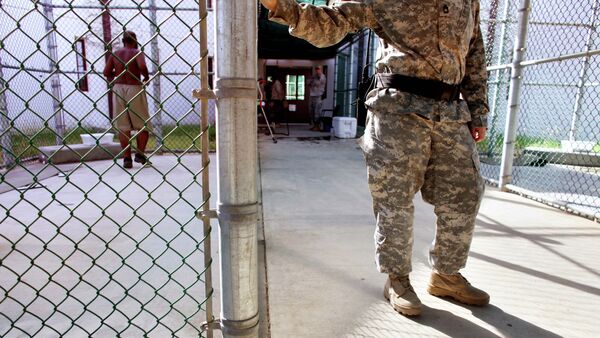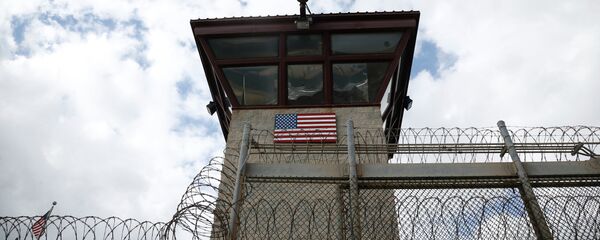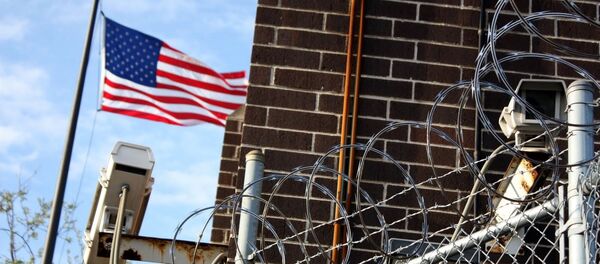There are three family detention centers in the country, in addition to more than 80 additional immigrant detention centers run by the Immigration and Customs Enforcement (ICE) along with privately-run detention facilities.
Migrants cross the US border & find themselves rounded up into the detention centers & put to work cleaning, landscaping cooking #freemarket
— peiratestouoneirou (@Peiratesoneirou) 4 августа 2015
Critics doubt conditions for detainees at all the facilities are satisfactory and claim that the illegal immigrants are being paid far less than the national minimum wage of $7.25 before taxes, and are sometimes forced to work despite the fact that labor at detention centers should be voluntary by law, the Times report.
“It's ironic — it's illegal for them to work, but they’re working for the immigration service in a sense,” argued Mark Krikorian, executive director of the Center for Immigration Studies, a conservative think-tank in Washington, as quoted by the Times.
“It can be a useful element of managing people in detention,” Krikorian added. “I don't have any problem with it in principle. The question is: Is it run well?”
In 1950, when the minimum wage in the United States was raised to $0.75 per hour, Congress passed a law permitting immigrant detention facilities to provide $1 per day for voluntary work, Carl Takei, a staff attorney with the ACLU National Prison Project, told the Times. During a 1979 review the rate was not raised, and in 1990 an appellate court kept the wage at the same level, arguing that “alien detainees are not government 'employees,' ” he explained.
For comparison's sake, Mexico's minimum wage was raised 4.2% in December to MXN 70 per day, or about USD 4.30 at the current exchange rate. If the daily stipend offered by the detention facilities had appreciated in step with the US federal unemployment rate since 1950, detainees would be paid about $9.67 per day, or a little over twice the minimum wage in Mexico, a common country of origin among detainees.
“We have a name for locking people up and forcing them to do real work without wages. It's called slavery,” said Takei, who recently visited a family detention center in Dilley, Texas.
Prison inmates can be forced to work, while detainees cannot, as detention is not intended to be punishment, he added.
ICE’s stance is to promote labor among detainees, suggesting that work improves discipline and morale; moreover, it significantly reduces expenses, which range in the detention system annually up to $2 billion.
“The program allows detainees to feel productive and contribute to the orderly operation of detention facilities,” Gillian Christensen, an ICE spokesperson, told the LA Times.
While the work program is legally valid in principle, the reality in ICE and for-profit detention centers is different, the Times revealed.
In class suits reportedly filed last year in Massachusetts and Colorado, immigrants alleged the program is involuntary and in some cases unpaid, and violates the minimum wage laws of the states. Moreover, detainees are charged two to seven times more in the detention centers' shops than in a local Wal-Mart, a study by Nancy Hiemstra, an assistant professor of migration studies, Stony Brook University, showed.
Earlier this summer, the American Civil Liberties Union (ACLU) said thousands of undocumented migrants, including children, are denied food, water and medical care while being held in frigid and filthy US detention facilities along the Mexican border.
The death of a detainee in May and inhumane treatment prompted up to 200 illegal immigrants at the Eloy Arizona Detention Center the next month to reportedly protest and stage hunger strikes demanding better living conditions and treatment at the facility.
In June, the UN High Commissioner for Human Rights slammed US immigration detention centers for their inhumane conditions, citing a lack of health care, violence and overcrowding. The UN envoy called for an overhaul of the US policy on illegal migrants, especially women and children, whose rights, he said, are being gravely violated.






